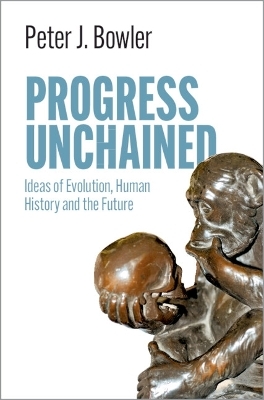
Progress Unchained
Ideas of Evolution, Human History and the Future
2024
Cambridge University Press (Verlag)
978-1-108-82942-7 (ISBN)
Cambridge University Press (Verlag)
978-1-108-82942-7 (ISBN)
- Noch nicht erschienen (ca. November 2024)
- Portofrei ab CHF 40
- Auch auf Rechnung
- Artikel merken
Bowler charts developments in thinking about progress using the emergence of Darwinism in biology to throw light on parallel changes in the understanding of social development. He shows how linear models of progress headed toward a final goal have been replaced by open-ended views defined by innovation and diversity.
Progress Unchained reinterprets the history of the idea of progress using parallels between evolutionary biology and changing views of human history. Early concepts of progress in both areas saw it as the ascent of a linear scale of development toward a final goal. The 'chain of being' defined a hierarchy of living things with humans at the head, while social thinkers interpreted history as a development toward a final paradise or utopia. Darwinism reconfigured biological progress as a 'tree of life' with multiple lines of advance not necessarily leading to humans, each driven by the rare innovations that generate entirely new functions. Popular writers such as H. G. Wells used a similar model to depict human progress, with competing technological innovations producing ever-more rapid changes in society. Bowler shows that as the idea of progress has become open-ended and unpredictable, a variety of alternative futures have been imagined.
Progress Unchained reinterprets the history of the idea of progress using parallels between evolutionary biology and changing views of human history. Early concepts of progress in both areas saw it as the ascent of a linear scale of development toward a final goal. The 'chain of being' defined a hierarchy of living things with humans at the head, while social thinkers interpreted history as a development toward a final paradise or utopia. Darwinism reconfigured biological progress as a 'tree of life' with multiple lines of advance not necessarily leading to humans, each driven by the rare innovations that generate entirely new functions. Popular writers such as H. G. Wells used a similar model to depict human progress, with competing technological innovations producing ever-more rapid changes in society. Bowler shows that as the idea of progress has become open-ended and unpredictable, a variety of alternative futures have been imagined.
Peter J. Bowler is Emeritus Professor of the School of History, Anthropology, Politics and Philosophy at Queen's University Belfast.
Preface; 1. Introduction: ladders and trees; Part I. The Ladder of Progress and the End of History: 2. From the chain of being to the ladder of creation; 3. The hierarchy of humanity; 4. Progress to paradise: Christianity, idealism and history; 5. Ascent to utopia: the quest for a perfect society; 6. End of an era?; Part II. Toward a World of Unlimited Possibilities: 7. Darwinian visions; 8. The uniqueness of humans; 9. Branching out: the evolution of civilizations; 10. Toward an uncertain future; 11. Epilogue: where did it all go wrong?; Bibliography.
| Erscheinungsdatum | 11.07.2023 |
|---|---|
| Zusatzinfo | Worked examples or Exercises |
| Verlagsort | Cambridge |
| Sprache | englisch |
| Themenwelt | Geschichte ► Teilgebiete der Geschichte ► Technikgeschichte |
| Naturwissenschaften ► Biologie ► Evolution | |
| Sozialwissenschaften | |
| ISBN-10 | 1-108-82942-2 / 1108829422 |
| ISBN-13 | 978-1-108-82942-7 / 9781108829427 |
| Zustand | Neuware |
| Haben Sie eine Frage zum Produkt? |
Mehr entdecken
aus dem Bereich
aus dem Bereich
Buch | Softcover (2024)
Lehmanns Media (Verlag)
CHF 27,90
Digitalisierung neu denken für eine gerechte Gesellschaft
Buch | Hardcover (2023)
Quadriga (Verlag)
CHF 27,95
Vom Perceptron zum Deep Learning
Buch | Softcover (2022)
Springer Vieweg (Verlag)
CHF 27,95


